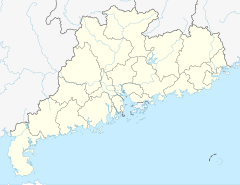| Wukan protests | |||
|---|---|---|---|
 Villagers confront riot police in Wukan, 11 December 2011 | |||
| Date | 21–23 September 2011, December 2011 | ||
| Location | 22°53′N 115°40′E / 22.883°N 115.667°E[1] | ||
| Caused by | Disputes over the sale of land by local authorities to private enterprises | ||
| Parties | |||
| |||
| Casualties and losses | |||
| |||
The Wukan protests (Chinese: 乌坎事件), also known as the siege of Wukan, was an anti-corruption protest that began in September 2011, and escalated in December 2011 with the expulsion of officials by villagers, the siege of the town by police, and subsequent détente[5] in the village of Wukan, in the east of Guangdong province. The villagers rose up again in June 2016, but were again suppressed.[6] The most recent rounds of clashes were in September 2016, when the former village leader Lin Zulian was sentenced to jail. The clashes were suppressed.
The protests began on 21–23 September 2011 after officials sold land to real estate developers without properly compensating the villagers. Several hundred to several thousand people protested in front of and then attacked a government building, a police station and an industrial park. Protesters held signs saying "give us back our farmland" and "let us continue farming." Rumors that the police had killed a child further inflamed the protesters and provoked rioting. Residents of Wukan had previously petitioned the national government in 2009 and 2010 over the land disputes. In an apparent attempt to ease tensions, authorities allowed villagers to select 13 representatives to engage in negotiations.
Security agents abducted five of the representatives and took them into custody in early December. The protests strengthened after one of the village representatives, Xue Jinbo, died in police custody in suspicious circumstances.[3][4] The villagers forced the entire local government, Chinese Communist Party (CCP) leadership and police out of the village.[7] On 14 December 2011, a thousand police laid siege to the village, preventing food and goods from entering the village.[5][8] Government authorities set up internet censorship against information about Wukan, Lufeng and Shanwei.[9]
Wukan is a village that had often been described as being especially harmonious.[10] International newspapers described the December uprising as being exceptional[5][7][11][12] compared to other "mass incidents" in the People's Republic of China which numbered approximately 180,000 in 2010.[13]
The village representatives and provincial officials reached a peaceful agreement, satisfying the villagers' immediate requests.[14] Local Chinese Communist Party Committee Secretary of Shanwei City said that the authority of the city has been "overridden" by provincial intervention.[15]
- ^ Cite error: The named reference
wukan_coordswas invoked but never defined (see the help page). - ^ Cite error: The named reference
FT20110923was invoked but never defined (see the help page). - ^ a b Cite error: The named reference
Telegraph_thumbswas invoked but never defined (see the help page). - ^ a b Cite error: The named reference
ThReut_thumbswas invoked but never defined (see the help page). - ^ a b c Cite error: The named reference
teleg_14Decwas invoked but never defined (see the help page). - ^ "Wukan: a village living in fear following arrest of party chief". 3 July 2016. Archived from the original on 4 July 2016. Retrieved 3 July 2016.
- ^ a b Cite error: The named reference
Hindu_police_evictedwas invoked but never defined (see the help page). - ^ Cite error: The named reference
BBC_14Decwas invoked but never defined (see the help page). - ^ Cite error: The named reference
BBC_wukan_censoredwas invoked but never defined (see the help page). - ^ Cite error: The named reference
scmp20111007was invoked but never defined (see the help page). - ^ Cite error: The named reference
NYT_14Decwas invoked but never defined (see the help page). - ^ Cite error: The named reference
wsj20111216pagewas invoked but never defined (see the help page). - ^ Cite error: The named reference
Bloomberg_180k_incidentswas invoked but never defined (see the help page). - ^ "Chinese village protester says government relents". CNN. 21 December 2011. Archived from the original on 29 December 2011. Retrieved 30 December 2011.
- ^ "BBC News – China round-up: Friendship with North Korea stressed". BBC. 21 December 2011. Archived from the original on 12 October 2018. Retrieved 30 December 2011.
